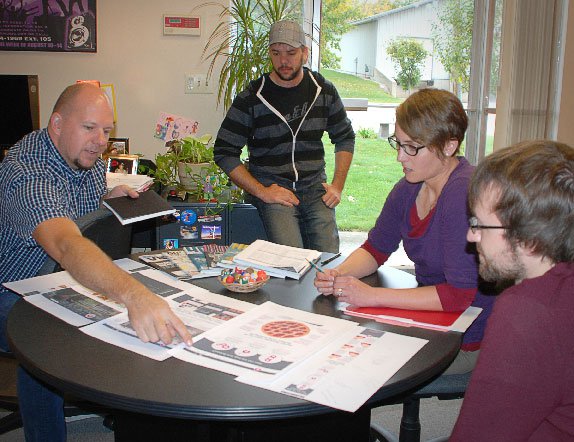When I tell people that I work at a company called Insight Creative, they often ask, “What makes it creative?”
Creativity and innovation are two of the most admired characteristics of modern companies and leaders because they are essential for success in a world defined by new technology and new forms of marketing.

However, as much as you may want your company to be creative, it can be difficult to know how to build an environment that encourages and supports the kind of creativity that success requires.
Here are five thoughts on how to create a creative workplace:
Allow Humor. Our president, Jim, likes to continuously remind us that workplaces with laughter are more effective, more productive, and healthier than the humorless alternative. When he does this, we all laugh nervously until he goes away and it really does make us feel better.
Educators know that a lesson taught with humor is a lesson retained. This is because humor unlocks anxiety-free, relaxed thought patterns that allow more connections in our brains and create more opportunities for ideas to bump into one another and mix together. What is true in the classroom is also true in the office. A company that laughs together creates better ideas.
Recognize every employee’s skills as part of the creative process. In marketing, people often split jobs into two categories: strategic/analytical jobs and creative jobs.
However, every strategic decision is part of the overall creative process, not separate from it. Creativity is a balance between intuitive, gut feelings and rational, logical thinking. Even though a particular job may require more analytical than divergent thinking during day-to-day tasks, creating opportunities to stretch both rational and intuitive thought muscles improves overall performance. Each skill supports the other in the big picture creative process, and recognizing this is one of the first steps to building a vision of your company as a creative environment.
Encourage writing. It’s guaranteed that everyone at your company has something interesting to say. Giving them an outlet to say it, such as in a company blog, not only gives them a chance to practice their creative habits and skills, but also encourages the sharing of ideas throughout the company. Creative skills learned while writing are highly transferable to other types of work, and the spread of ideas between coworkers that writing creates becomes the seeds from which companies grow.
Be open for feedback. Make these company-wide laws:
First you have to know that it’s okay for you to ask your colleagues for feedback. Then when you ask for feedback, you have to be able to trust that person is being truthful and that they’re not holding back doubts or concerns because they’re afraid of upsetting you. Sure, sometimes when you get feedback you might feel frustrated or personally offended, but that only happens when the tone of the feedback is aggressive or not fully honest.
Whenever I get high quality feedback, I feel a huge sense of relief, not a negative reaction. Feedback is an essential part of the creative process, because it helps you step back and see the big picture again after being so close to the details. It helps you see and change the things that were bothering you but you couldn’t see clearly. Companies that give open, frequent, honest feedback just keep getting better and better and more creative every day.
Take time to explore. If you’re working on a project, it’s tempting to go with the first idea you have because of excitement or impatience or both. But usually the first idea we have is also the most obvious and generic one because it’s the one that comes to mind right away. With a little more exploration, you’re likely to find more unique and effective ideas because they won’t be the most obvious ones. You’ll also have more options to choose from which increases your chances of choosing the best idea. Give yourself time to dig a little deeper than the first layer.
No one said it better than these two:
“The best way to get a good idea is to get a lot of ideas.” -Linus Pauling
“Nothing is more dangerous than an idea when it’s the only one we have.” -Émile Chartier
© Insight Creative, Inc. All rights reserved.